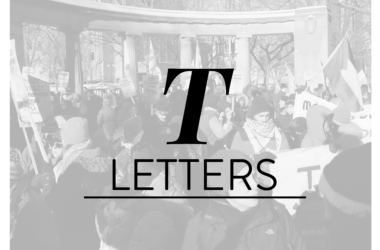In The McGill Tribune’s Jan. 21 editorial, a photo that I had taken earlier in the month at a demonstration was used to accompany the article, without my permission and without credit.
It is true that, at student publications, mistakes are often made, and without a journalism school at McGill, they are more likely to occur. I too am guilty of making journalistic errors. But, it is unacceptable to use a photo for an article without first asking for permission.
When a newspaper does not ask a photographer about using their photo and fails to credit them, especially when they display it as the symbol of an article with which the photographer may hold concerns, it feels really disrespectful. In a Facebook post summarizing the editorial, the Tribune purports an understanding that “it is imperative to highlight the experiences of McGill students who are directly affected by jarring political events,” yet the Board used my photo, that of an Iranian-American journalist–someone whose family is affected by the ramifications of the American government’s decisions and whose mental health has suffered this past month–without permission or credit.
Asking the photographer if they are comfortable with their image being displayed as the visual representation of an article is crucial. But, there is also more to it than showing respect and courtesy; without giving credit, it is plagiarism, and it is especially ironic given my lived experience and the Tribune’s claims to be uplifting marginalized voices.
In an industry that heavily underrepresents racialized women, it is imperative that publications, even student ones such as the Tribune, respect our work. It is not enough to claim that one supports marginalized peoples–it must be consistently demonstrated through concrete actions.








This has nothing to do with race or gender. Stop it.